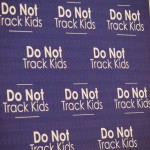
Students from Noble and Greenough School in Dedham, Mass., including Emily Woodward, above, said they all use the Internet regularly, but they do not ask for parental permission. (Mattias Gugel/Medill)
WASHINGTON — The Republican and Democrat who head the Congressional Privacy Caucus are leading an effort to pass a bill that would tighten regulations on companies collecting personal information about children online, specifically focusing on mobile communications and targeted advertising.
The Do Not Track Kids Act of 2011 is an attempt to update online protections already established for children in The Children’s Online Privacy Protection Act. Congress passed COPPA in 1998 as an attempt to protect the personal information of children online, but it does not address privacy issues that have arisen from new technology over the last dozen years.
So, Rep. Edward Markey, D-Mass., introduced a bill that would require the Federal Communications Commission to enforce guidelines limiting the capability of websites, mobile providers or advertisers to use personal data of children 13 and younger.
At a news conference announcing the bill, Markey and Rep. Joe Barton, R-Texas, co-chairs of the Congressional Privacy Caucus, both expressed concern over children’s online activities that could harm their well-being and future careers
Markey said people should not be denied jobs because of a picture they posted when they were younger. He also said that a girl who searches one time for weight loss information should not be targeted with weight-loss ads every time she goes online because a company has profiled her as a young female interested in weight loss.
This bill would stop companies from tracking minors online without the consent of parents, and it would restrict the use of targeted advertising. This measure also proposes an “eraser button” that would allow parents to remove any information about their child stored on the Web.
“Parents deserve to know what types of information are being collected about their kids online and how it is being used,” said Barton, a co-sponsor of the bill. “If you don’t like what you learn – our bill will give you the authority to change it with just the click of a mouse.”
As mobile communications become more popular, this bill aims to protect children who uses mobile devices to communicate, such as cell phones and tablets, many of which have tracking components.
Emma Llanso, policy counsel for the Center for Democracy and Technology, said she appreciates the bipartisan attention this bill has received, but she believes all Internet users should get the proposed protections, regardless of age. She said the spirit of the Do Not Track Kids Act is good, but the bill could lead to mandatory age verification, increased collection of personal information from Internet users and the infringement of teenagers’ rights to access lawful speech online.
Actor Nick Cannon, celebrity spokesman for Common Sense Media, a group that advocates for children’s safe use of technology, spoke in support of the bill at the hearing. He said that even if COPPA is updated to better regulate companies gathering information on the Internet, parents still need to check what their children are doing online.
“Most at that age don’t have the judgment or the maturity to protect themselves from those capable of taking advantage of them by tracking their whereabouts on the Internet,” the America’s Got Talent host said. “Parental supervision should extend from the playground to the internet.”
Facebook requires that its members be at least 13 years old, but that does not prevent underage minors from signing up by saying they’re older and using the social network. According to a Consumer Reports study released last May, 7.5 million Facebook users in the U.S. are under the age of 13; 5 million are under 10.
Children under 13 who post information on Facebook that can be viewed publicly foil safeguards afforded by COPPA, which prohibits sites from knowingly disclosing children’s personally identifiable information.
Eighth graders from Noble and Greenough School in Dedham, Mass., attended the hearing to see their congressman, Markey, during a class trip to Washington. At the end of the news conference, they were asked to raise their hands if they use the Internet on a daily basis — all of the students’ hands went up. But when asked how many asked for parental permission, none raised their hands.
Student Mimi Connors, 14, said after the hearing that privacy on the Internet is not a problem she faces right now, but she might care “maybe when I’m older.”
Children ages 8 to 18 spend an average of an hour and a half online daily, an increase of 45 percent from five years prior, according to a study by the Kaiser Family Foundation in January 2010. Cell phone ownership also has increased dramatically, growing from 39 percent of 8- to 18-year-olds in 2004 to 66 percent in 2009.
“Tracking our most vulnerable, our young children, must be outlawed and I am delighted that Congress is finally taking the necessary action with the Do Not Track Kids Act,” said Cannon, a father of 10-month-old twins. “The bipartisan effort demonstrates that the two parties can actually agree on at least one thing — the safety of our children. Kids make up 20 percent of our population but 100 percent of our future.”
- Students from Noble and Greenough School in Dedham, Mass., including Emily Woodward, above, said they all use the Internet regularly, but they do not ask for parental permission. (Mattias Gugel/Medill)
- Nick Cannon, celebrity spokesman for Common Sense Media, spoke on Capitol Hill in favor of the Do Not Track Kids Act on March 7. “Much of my career has centered around humor and entertainment. However, what is happening today online is anything but a laughing matter,” he said. (Mattias Gugel/Medill)
- The proposed anti-tracking bill would forbid Internet companies from sending targeted advertising to children under 13 and collecting personal and location information without parental or individual consent. It would also require webmasters to have an “eraser button,” allowing parents to delete personal information from search engines and social networking sites. (Mattias Gugel/Medill)
- Rep. Edward Markey, R-Mass., said he supports the bill as a way of protecting the future of America’s children. “It’s not about Big Brother – it’s about Big Mother and Big Father,” he said. “The Do Not Track Kids Act will ensure that kids are protected and that their sensitive personal information isn’t collected or used without express permission.” (Mattias Gugel/Medill)
- “When I started working on the Do Not Track Kids Act, it wasn’t just as a public servant, it was as a parent,” said Rep. Joe Barton, R-Texas. “My 6-year-old-son logs on to our computer every day, always under the watchful eye of my wife and I. We can see which website he visits, but what we don’t see is the information they collect about him.” (Mattias Gugel/Medill)
- Current law needs to be revised to account for substantial growth in the digital marketplace, said Kathryn Montgomery, professor at American University’s School of Communication. “Safeguards are especially needed for teens, many of whom are living their lives online, but who are unaware of the privacy threats they face,” Montgomery said. (Mattias Gugel/Medill)











